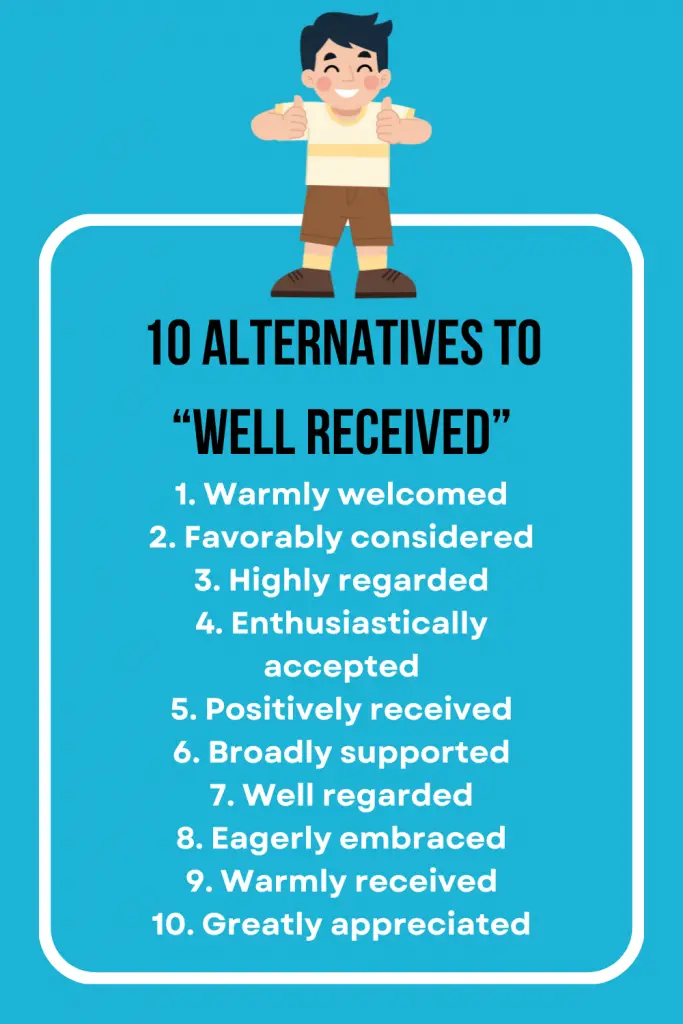When someone sends you something and you’re trying to nicely say “Yep, got it thanks!” but it sounds weird and informal. Therefore people like to use the phrase “well-received” in their emails. In this post I will give you a little guide looking at what “well received” really means when you might want to use it (or not use it!) and some friendlier alternatives you can try instead.
What Does “Well Received” Mean?
When people say something was well received, what they usually mean is that it went over pretty well. Like if you send an email with a report or proposal to your boss and they write back saying it was well received, that’s their fancy way of saying they liked it.
It’s one of those business-speak phrases that people use when they want to sound extra proper. But really it just means the thing you sent got to them and they thought it was solid. Probably better than if they came back with corrections or complaints!
So yes, well received is nothing more than their polite way to tell you that your stuff was good and they appreciate you sending it over.
Here is a short email including the phrase “well received”:
Dear Tim,
I hope this email finds you well. I wanted to let you know that your recent marketing proposal was very well received by the team.
Best regards,
Sarah
Can I Say “Well Received” in Email?
Yes, you can definitely use it! Using “well received” in emails is a nice way to say how well the other party’s ideas or work landed. This phrase is particularly useful in professional or business communications.
For example, at the end of the day, checking in on how your contributions land is a smart practice. Doing so over email when appropriate can be effective. And framing it with a phrase like well received keeps things sounding polite.
Alternatives to “Well Received”
1. Warmly welcomed
Example: “Your innovative ideas were warmly welcomed by the entire team during the meeting.”
Usage: “Warmly welcomed” is a great phrase when you want to show someone that their idea or suggestion not only works for you but that you’re genuinely excited about it too. It’s like saying “We don’t just accept this – we embrace it with open arms!” Nice and friendly.
2. Favorably considered
Example: “I am pleased to inform you that your application has been favorably considered by the committee.”
Usage: This is more formal. Like when you get someone’s application or proposal at work and you approve it and say “Yes, it’s confirmed, we’ve given it serious consideration and given it the thumbs up.”
3. Highly regarded
Example: “Your work on the project has been highly regarded by all our stakeholders.”
Usage: Use it when you want to say that something goes beyond just being accepted. It’s held in high admiration like quality work or great ideas or something. More for a professional talk where you want to praise the standard of whatever it is.
4. Enthusiastically accepted
Example: “The new policy was enthusiastically accepted by the employees.”
Usage: It’s often used when new ideas, changes, or proposals are not just agreed upon but are met with a high level of energy and positivity.
5. Positively received
Example: “The feedback from the client was positively received, indicating satisfaction with our services.”
Usage: Positively received is more middle-of-the-road happy. It’s for when suggestions or information get the thumbs up without all the jazz hands.
6. Broadly supported
Example: “Your proposal for the new work schedule has been broadly supported by the department.”
Usage: Whip that one out when the team/company fully has your back and is down for the cause. It’s like the whole cavalry coming over the hill to support your plan. This big coalition of folks is pumped to move forward together.
7. Well regarded
Example: “Your contributions to the research are well regarded within the academic community.”
Usage: “Well regarded” works great in professional settings when you want to show respect for solid work. It’s a nice way to give props when deserved.
8. Eagerly embraced
Example: “The new technology integration plan was eagerly embraced by the IT department.”
Usage: “Eagerly embraced” means that people are genuinely excited to take on something new. Maybe it’s an idea, a change, or a suggestion, but people are fired up about it. This shows real readiness to dive in.
9. Warmly received
Example: “The announcement about the additional holiday was warmly received by all employees.”
Usage: If something tells you “warmly received” you will definitely feel welcome. It’s a friendly vibe – cordial even. More than just a thumbs up, it’s enthusiastic agreement.
10. Greatly appreciated
Example: “Your timely assistance on the project was greatly appreciated by the team.”
Usage: Saving the best for last, greatly appreciated packs a punch. Bust this out when you want to emphasize how meaningful someone’s help or efforts were. Deepest gratitude.

Conclusion
Long story short, well received is a pretty versatile and effective way to express positive acknowledgment in email communication. It gets the job done whether the email’s formal or casual without going over the top.
FAQs Regarding the Use of the Phrase “Well Received” in Emails
1. Is it correct well received or well-received?
Both “well received” and “well-received” can be correct, but their usage depends on the context of the sentence:
• As a Verb Phrase (without hyphen): When used as a verb phrase following a verb, it is usually written without a hyphen. For example: “Your report was well received by the committee.”
• As an Adjective (with hyphen): When used as a compound adjective before a noun, it is hyphenated. For example: “The well-received proposal generated a lot of positive feedback.”
2. What does “well received” mean in an email?
• “Well received” in an email context means that the information, suggestion, or proposal sent has been received positively and favorably by the recipient.
3. Is it formal to use “well received” in professional emails?
• Yes, it’s considered formal and professional. It’s a polite way to acknowledge that you have received and appreciated the email content.
4. Can “well received” be used in informal email communication?
• While it’s more common in formal emails, it can be used in informal emails too, especially if you want to convey a sense of professionalism or appreciation.









